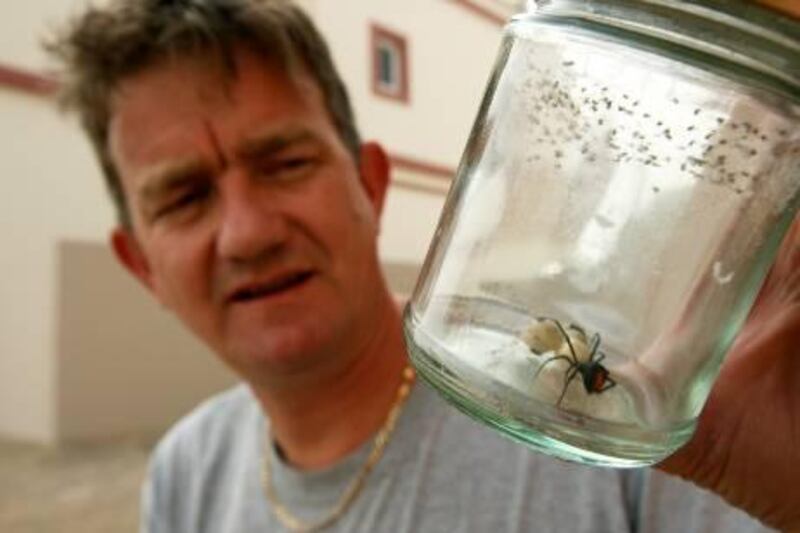DUBAI // Alan Hopps got more than he bargained for when he bought a plant from a nursery in the emirate this week - his leafy purchase came with a widow spider and its nest.
Mr Hopps, a 47-year-old American pilot who lives with his family in The Villa, a community near Silicon Oasis, transferred the spider and her nest to a jar and, yesterday, dozens of babies hatched.
It is not known if the widow specimen Mr Hopps found belongs to the infamous Australian variety but even if it does not, the venom of any widow spider may cause headaches, nausea or more severe reactions in the case of infants and the infirm.
The National has sent the specimen to a widow spider expert in Europe, who has studied the UAE variety, for positive identification.
Mr Hopps was happy to have them out of his house, where was he hosting a birthday party for his daughter. "We could have had tens of them running around the garden - and 10 kids," he said.
The spider came in a plant that was one of a boxful he had purchased on Wednesday from a low-cost market not far from Dragon Mart called the Plant Souq.
Dozens of residents from Sharjah to Abu Dhabi have reported seeing what are commonly believed to be Australian redback spiders, one of 30 species of the genus Latrodectus that are informally known as widow spiders.
The venom of all widow spiders species are believed to harm humans. They can be countered with same antivenin, which is available in hospitals in Dubai and Abu Dhabi.
Specialists say the widow spiders found in the UAE are not in fact Australian redbacks. Though they bear a similar red stripe, they have different DNA and other microscopic differences like the details of their genitalia, length of hair and shape of red stripe.
The spiders that Mr Hopps found will be tested by Dr Barbara Knoflach-Thaler at the University of Innsbruck in Austria, one of two scientists who have studied UAE widow spider specimens.
"Latrodectus is unfortunately really notorious - they are really difficult to be identified," she said.
The Australian redback has been found in New Zealand, Japan, Belgium - where it was eradicated - and Tristan da Cunha, a remote island in the southern Atlantic Ocean, said Robert Raven, the head of terrestrial biodiversity at the Queensland Museum in Australia.
"But by all accounts we haven't seen anything in the UAE that matches the Australian redback," he said.
Confusion over the species stretches back more than a century, with one European scientist calling another an "ignoramus" in an early 1902 scientific journal over the issue, he said. An American arachnologist declared in the 1960s that only six Latrodectus species existed, only to retract that conclusion 20 years later.
"So Latrodectus is both toxic in venom and politics," Dr Raven wrote in an email.
Widow spiders here are often found outdoors and under objects, said Sabu Shajahan, the operations manager at Pest Management Control. His firm had sighted them in gardens and warehouses, he said.
Several doctors said the threat of the spider might be exaggerated - though they had heard of sightings, they had not encountered cases of bites.
"We have the antivenin but we never use it. I have never come across a patient seeking advice regarding being bitten by a redback spider," said Dr Ahmed Saleh Abdou, a consultant for infectious diseases at Rashid Hospital in Dubai.
Dr Yasser Sharif, who oversees medication and medical product safety at the Health Authority-Abu Dhabi, said he also had not seen cases of widow spider bites.
He warned that residents should be just as cautious about the pesticides used to kill the spiders. Unlicensed firms might use products that can harm humans, especially children, and their fumes could spread into neighbours' homes, he said.
"They are good to kill insects but they can also kill human beings," he said. "The consumer should check if the company is licensed, should ask the type of pesticide and the type of ingredient."
[ chuang@thenational.ae ]






